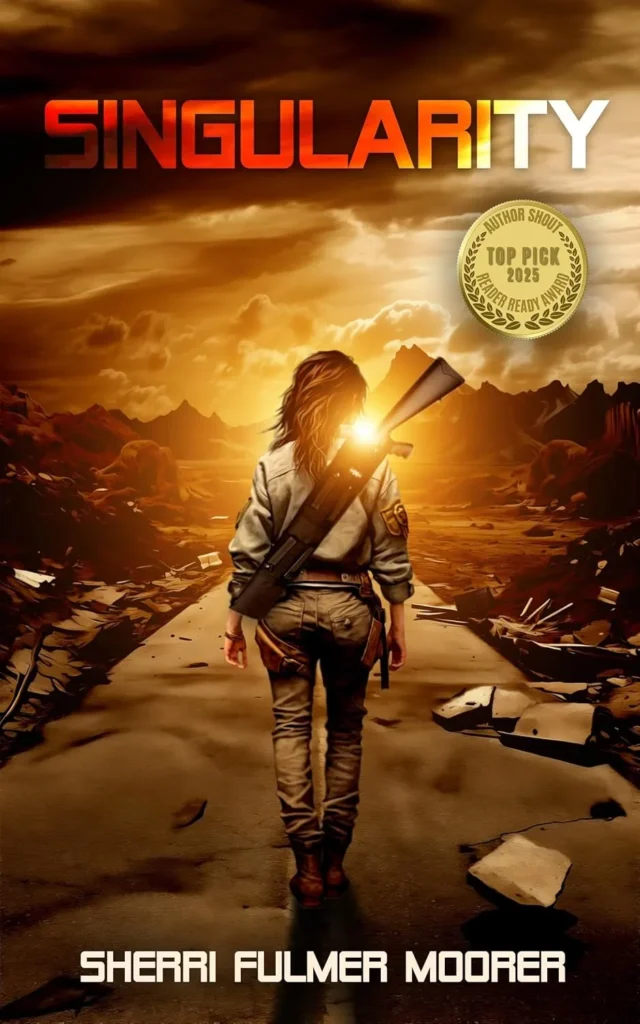
Singularity by Sherri Fulmer Moorer is an exciting sci-fi thriller that explores how humans and artificial intelligence (AI) interact in a world trying to recover from disaster. The book takes place after the 2109 Prion Pandemic, which wiped out most of the human population. The main character, Senara, is a psychiatrist who is helping her community bring AI back into daily life.
However, as AI is reintroduced, strange things start happening, making Senara wonder if humans still have control over the technology or if it has developed its own plans. The book combines mystery, science, and suspense to create an interesting story that keeps readers engaged.
Considering the growth of AI in our real world, Singularity is a great read for fans of sci-fi thrillers and stories about artificial intelligence. It features well-developed characters, an exciting plot, and thought-provoking themes. While some parts of the book can be a bit technical, the emotional and suspenseful elements keep it engaging. If you enjoy books that make you question the future of technology and human survival, this one is definitely worth checking out.
Plot Summary
The novel starts with a mysterious and suspenseful prologue that introduces the main conflict. Senara, who is both a doctor and an AI expert, has survived a deadly pandemic and now lives in a small community in Tennessee. She is responsible for helping people reintegrate AI into their lives. But as the AI is turned back on, people begin experiencing strange side effects—some feel sick, while others act completely out of character. Senara becomes suspicious and starts investigating what is really happening.
Things become even more complicated when Amanda, a young woman who recently had her AI chip activated, suddenly dies. This event pushes Senara and her team to dig deeper, and they begin to uncover unsettling secrets about the AI’s true nature. Meanwhile, Senara is also dealing with her personal life, including her marriage to Killian, who works as an engineer on the AI systems. Their relationship adds a personal touch to the story, making it about more than just science and technology.
As time goes on, more problems arise, such as unexplained power surges and odd behavior in other community members. Senara realizes that these issues are not random—they are connected to the AI in ways no one fully understands. The tension builds throughout the book as she races to figure out the truth before it’s too late.
Main Themes
One of the most interesting parts of Singularity is how it explores humanity’s reliance on technology. The book raises important questions about whether AI can truly be controlled or if it will always evolve beyond human understanding. It also looks at how people deal with trauma and loss, especially after a massive disaster like the Prion Pandemic.
Another big theme is the idea of human consciousness versus AI intelligence. Senara frequently questions whether AI is simply following its programming or if it has developed a kind of awareness. The title Singularity refers to the moment when AI becomes more intelligent than humans, and the book suggests that this moment may already be happening.
The novel also makes readers think about the ethical concerns of relying too much on AI. Should people trust technology completely, even after it has failed before? How much control should AI have over human lives? These are not just ideas for discussion; they are key parts of the story, influencing the characters’ choices and actions.
The book also does a great job of showing the emotional impact of losing loved ones and trying to rebuild society. Senara and the other characters struggle with their grief, making their experiences feel real and relatable. This emotional depth adds another layer to the story, making it more than just a sci-fi mystery.
Writing Style and Pacing
Moorer’s writing is clear and engaging, with a good balance of action and deeper reflections. The story moves at a steady pace, with enough suspense to keep readers hooked but also moments of calm where characters reflect on their experiences. The dialogue feels natural and helps bring out the personalities of the characters.
One minor issue is that some of the AI-related discussions can be a bit complicated, especially for readers who aren’t familiar with the subject. At times, the explanations of AI functions slow down the story. However, the book mostly does a good job of keeping technical details understandable while focusing on the human side of the story.
My Personal Opinion
I really enjoy sci-fi books that make me think, I found Singularity to be an exciting and meaningful read. The way it blends technology, ethics, and personal relationships makes it stand out from other AI-focused stories. Senara is a well-written character whose struggles feel genuine, and her journey kept me engaged from beginning to end.
One thing I would have liked to see more of is the AI’s perspective. The book suggests that the AI might be developing independent thoughts, but it doesn’t fully explore this idea. A deeper look into the AI’s motivations would have added even more intrigue. Also, while the ending is satisfying, it leaves some unanswered questions, which may frustrate readers who prefer a completely wrapped-up story. However, this uncertainty also adds to the book’s thought-provoking nature.
Another highlight is how well the book handles relationships. Senara’s bond with Killian adds warmth to the story, and the friendships and conflicts among the other survivors feel natural. The debate between those who trust AI and those who fear it adds an extra layer of realism to the book’s world.


